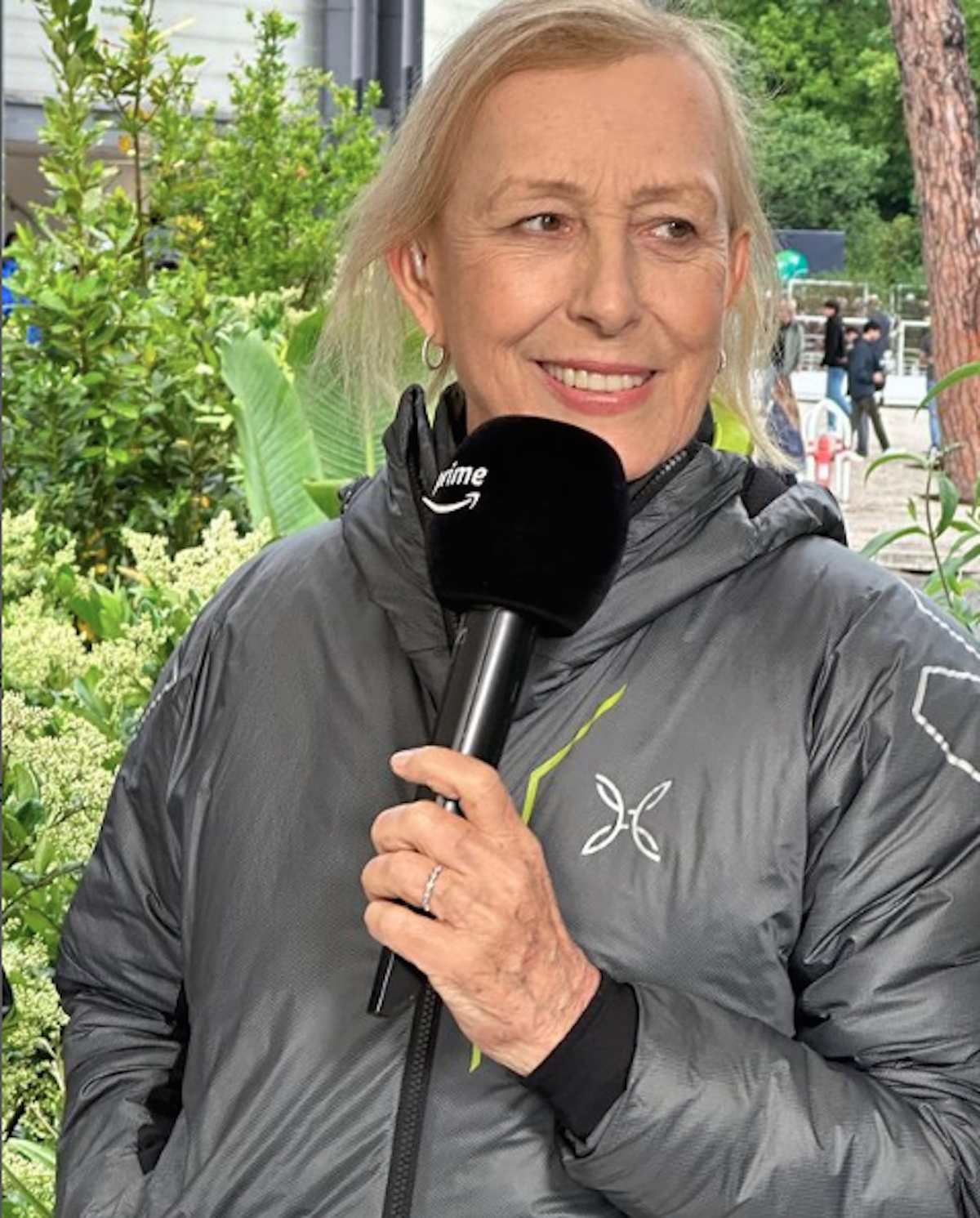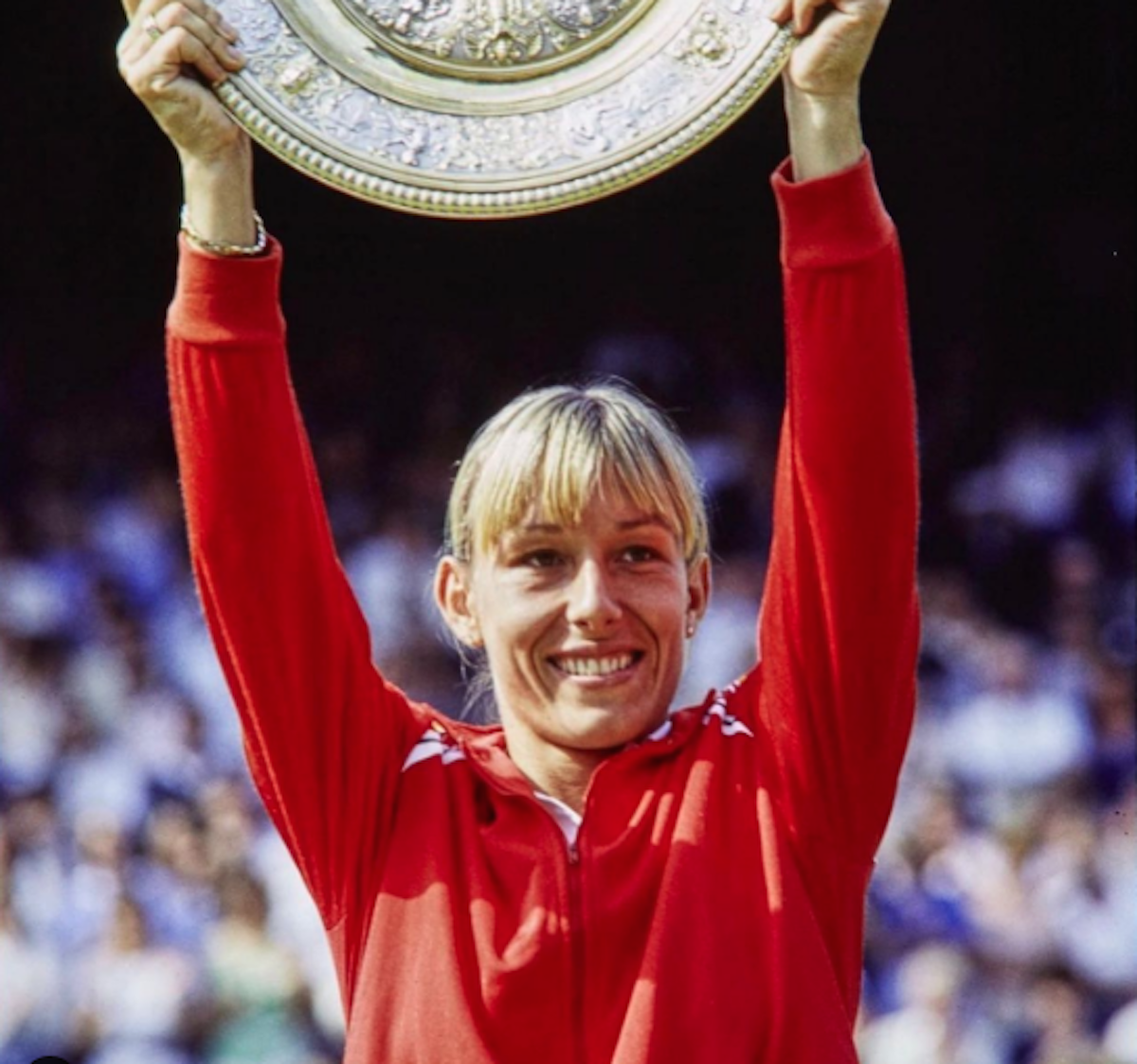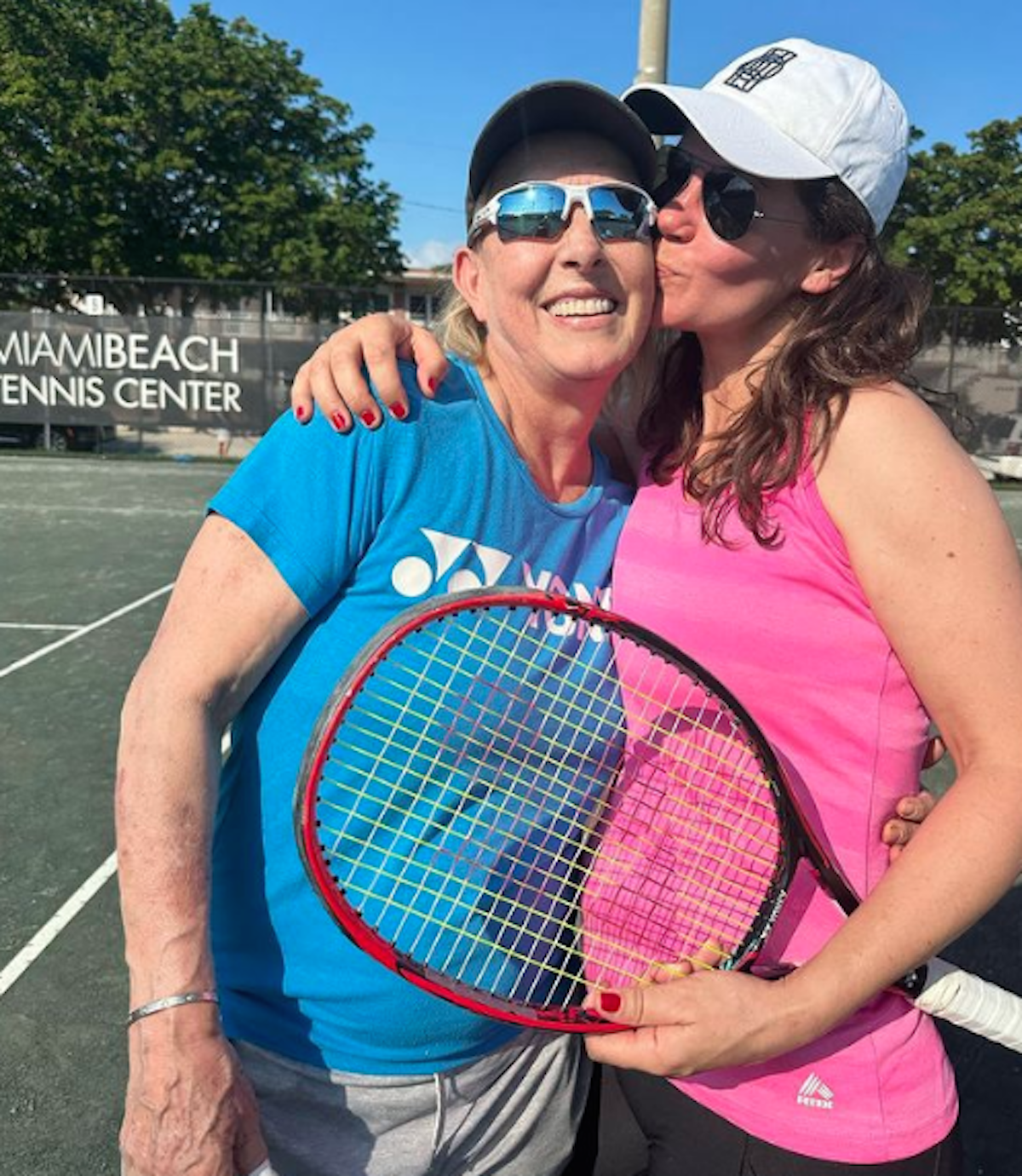Martina Navratilova Is 'All Clear' From Cancer
- Martina Navratilova, 66, has been given the “all clear” after being diagnosed with stage 1 throat cancer and breast cancer in January
- The tennis star has come a long way after previously battling a noninvasive form of breast cancer called ductal carcinoma in situ (DCIS) back in 2010 and facing adoption challenges with her wife Julie Lemigova.
- Navratilova was clearly determined to overcome breast cancer and throat cancer. And like so many survivors know, the journey continues even after treatment ends.
- SurvivorNet recommends people moving into survivorship to follow treatment guidelines, maintain a healthy weight, eat a healthy diet, exercise and limit alcohol consumption.
The 66-year-old Czech-American sports superstar, an 18-time Grand Slam singles champion and nine-time Wimbledon champion, had to put big life plans on hold – like adopting a child with wife Julie Lemigova of “Real Housewives of Miami” – as she received treatment, but now she can look forward to all the joys of life after cancer.

After a day full of tests at Sloan Kettering, I got the all clear! Thank you to all the doctors, nurses, proton and radiation magicians etc- what a relief:)#byebyecancer 🙂 and yes, #fuckcancer !!!
— Martina Navratilova (@Martina) June 19, 2023
The “all clear” announcement, comes after Navratilova told famous British TV host Piers Morgan in March, “As far as they know I'm cancer-free.”
At the time, the tennis great said she should be “good to go” after continuing additional preventative radiation treatment.
Expert Cancer Resources
- Most People Will Get This Virus. But Fewer People Know It Can Cause Cancer: Concerning New Evidence About HPV.
- How To Treat Metastatic Breast Cancer: The Drug Trodelvy Shows A Promising Boost In Survival Rates
- HER2-Low Breast Cancers: Are Patients Being Reclassified and Getting Life-Changing Treatments One Year Out? Major Cancer Centers Say Yes
- What Are CD4/CD6 Inhibitors? And How Can They Fight Advanced Breast Cancer?
She also admitted she had felt “total panic for three days thinking I may not see next Christmas” when she received her diagnosis, The Guardian reports.
“The bucket list came into my mind of all the things I wanted to do. And this may sound really shallow, but I was like, OK, ‘which kick-ass car do I really want to drive if I live like a year?'”
Martina Navratilova’s Cancer Journey
When Martina Navratilova announced in January 2023 that she had stage 1 throat cancer, she wrote, “The prognosis is good and I will start … treatment this month. The cancer type is HPV and this particular type responds really well to treatment.”
She was referring to the human papillomavirus, the most common sexually transmitted disease, which raises your risk of several cancers, including throat.

The statement also noted that the cancer was found after Navratilova discovered an enlarged lymph node on her neck while she was at the WTA finals in Fort Worth, Texas.
It was then, while undergoing testing for her throat, that a suspicious lump was detected in her breast, which was “subsequently diagnosed as cancer, completely unrelated to the throat cancer.”
Thankfully, both cancers were found in early stages and had good prognoses, as per the statement.
Navratilova, who is now officially cancer free after receiving the “all clear” returned to her job with the Tennis Channel just in time for the Miami Open in March.
Meanwhile, Navratilova’s recent cancer battle was not the only time Navratilova faced a disease. She was first diagnosed with ductal carcinoma in situ (DCIS), a noninvasive form of breast cancer, in 2010.
DCIS means abnormal cells in the breast milk duct have become cancerous but have not yet metastasized, or spread, to other parts of the body.
During this time, Navratilova underwent radiation and a lumpectomy treatment (when a surgeon removes a portion of cancerous breast tissue).
For more information on this disease, SurvivorNet is proud to offer a large resource center on Breast Cancer, treatment options, and the latest advancements that are changing lives today.
Martina Navratilova and Wife Julie Lemigova Faced Adoption Challenges
Before her two cancer diagnoses, Martina Navratilova was hoping to try again for a child again with her 50-year-old Russian former model wife, Julie Lemigova.
The pair, who wed in December 2014, had ultimately decided to pause their motherhood plans when Navratilova found out she had cancer again.
Speaking to Piers Morgan this past March, Navratilova explained. “We were thinking about adopting but that's definitely put on hold, and I don't think it's going to happen.
“I think it's just too complicated and the energy, I only have so much right now."

Navratilova, who retired back in 2006, admitted that the idea of adoption was “nice,” however it now seems unlikely.
“I'm not really the youngest anymore and I don't want to be the grandmother on the playground,” she further explained, according to the Daily Mail. “Forget that part, there's just not enough space I think for this to happen.
“So we will think about adopting but, that's definitely put on hold I don't think it’s gonna happen.”
That same month, Lemigova also offered some insight into their adoption plans during a Real Housewives Of Miami reunion.
Lemigova told the RHOM cast and host Andy Cohen, “When you're adopting a child, it has to be about the child. And, right now, it's everything about Martina, and for her [to be] getting healthy.”
“So, we're putting it on hold,” Lemigova said, according to Bravo TV. “You know, we were thinking [that at] any moment, the agency would call and give us happy news that we're going to have a baby… Instead, we are fighting two cancers. Like one was not enough.”
Children After Cancer
Although Martina Navratilova and Julie Lemigova had previously hoped to adopt a child, adoption may not be the path other survivors choose to take when growing their family.
Some people hope to conceive children, and it's important to know that cancer treatments may affect a woman's fertility and ability to conceive.
According to Dr. Sarah Cate, a breast surgeon at Mount Sinai, the level of treatment and stage of the disease play a role in determining whether a woman can conceive after cancer treatment.
“Fertility after a breast cancer diagnosis is fairly complicated. Some patients that need chemotherapy may be able to have children afterward because chemotherapy pauses menopause,” Dr. Cate previously explained to SurvivorNet.
Women expected to undergo cancer treatment should talk to their doctor about the impact treatment will have on their fertility. For example, chemotherapy drugs may stop the ovaries from releasing eggs, and radiation can harm nearby reproductive organs, according to the National Cancer Institute.
But survivors should know that there are options to preserve fertility before treatment is started.
Dr. Cate added, “I always ask patients that either don't have kids or are at an age where they could have kids, do they want more children. Then we talk to them about preserving fertility, meaning typically to either take eggs or to make embryos if they have a significant other.”
The preserved eggs or embryos could be implanted in the woman or a surrogate after treatment.
The Impact of Cancer on a Growing Family
The impact of Martina Navratilova's recent double cancer diagnosis and the journey was definitely felt by her loving wife.
This scenario plays out following a diagnosis for many families helping the cancer warrior in their fight. It's important for family members and close friends to be as supportive as possible for the cancer warrior.
Dr. Terri Woodard On Options For Preserving Fertility After a Cancer Diagnosis
Licensed clinical psychologist Dr. Marianna Strongin told SurvivorNet in an earlier interview, it’s “important that you surround yourself with individuals who care and support you throughout your treatment,” which she noted can be an “arduous chapter.”
It’s important cancer warriors have a strong support system to help ease their anxieties during a challenging time in their lives.
It's Very Important to Connect: A Survivor's Advice For Getting Through Cancer
“There are a number of common things cancer patients can experience, such as anxiety, depression, financial toxicity, social isolation, and sometimes even PTSD,” Dr. Shelly Tworoger, a researcher at Moffitt Cancer Center told SurvivorNet.
Some ways loved ones can help cancer warriors include helping out with household chores, running errands or preparing them a meal to eat. Sending them gifts can also help lift the spirits of your loved one fighting their disease.
While comforting the cancer warrior in your life is extremely helpful, don't forget to care for yourself. Caregivers of cancer warriors are greatly impacted by the everyday challenges the disease can bring.
Staying Strong & Healthy In Survivorship
Martina Navratilova was clearly determined to overcome breast cancer and throat cancer. And like so many survivors know, the journey continues even after treatment ends.
“Once a patient has finished his or her active therapy for breast cancer, we will often refer to that time as breast cancer survivorship,” Dr. Erica Mayer, a breast cancer medical oncologist at Dana Farber Cancer Institute, previously told SurvivorNet.
Handling Fear When You Get the Diagnosis
“This is a time when patients are still being actively monitored by their treatment team, not only to ensure that they remain healthy and cancer-free in the years ahead, but also to make sure that they have recovered from any side effects of their initial treatment, and that they are pursuing healthy behaviors for example, getting regular exercise, eating a healthy diet, and keeping up with all their other routine medical care,” Dr. Mayer explained.
SurvivorNet has some helpful tips to keep your health in top form as you move into survivorship:
- Follow Treatment Guidelines. This may include taking oral medication for a set period of years, and this is a critical step to keeping the cancer at bay.
- Maintain a Healthy Weight. Obesity can increase your cancer risk so maintaining a healthy body weight is important. Talk to your doctor to learn what an ideal body weight is for you and get some help reaching your fitness goals. Dr. Elizabeth Comen, a medical oncologist at Memorial Sloan Kettering Cancer Center and medical advisor to SurvivorNet, says, “There's evolving data to suggest that [healthy body weight] decreases significantly the risk of breast cancer.”
- Eat a Healthy Diet. As we previously noted, a well-balanced diet is important to help reduce the risk of cancer recurrence and maintain healthy body weight. “We know that diets that are heavy in sugar content are also usually unhealthy and can lead to weight issues. So it all really funnels back to maintaining a healthy body weight when it comes to lifestyle factors,” Dr. Elisa Port, a surgical oncologist at Mount Sinai explained to SurvivorNet.
- Exercise. Exercising helps condition your body to offset fatigue and it also helps maintain good body weight.
- Limit Alcohol. Heavy alcohol intake increases your cancer risk. “We say alcohol in moderation is probably fine, which is defined as three to five drinks a week. More than that can also potentially increase the risk of recurrence,” Dr. Port said.
MORE: How To Reduce the Risk Of A Breast Cancer Recurrence
Contributing: SurvivorNet Staff
Learn more about SurvivorNet's rigorous medical review process.

